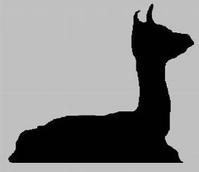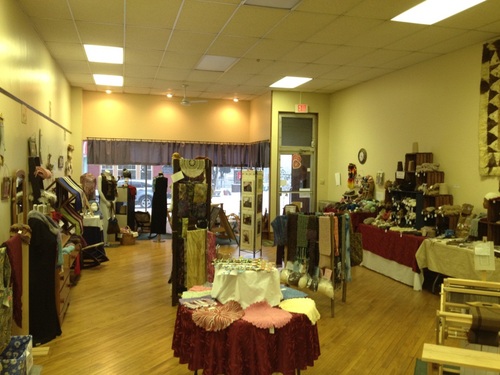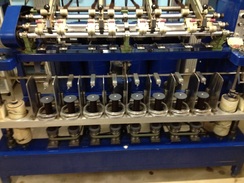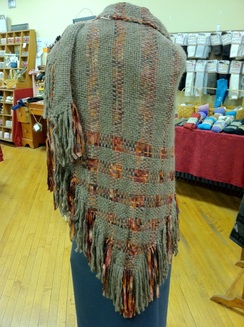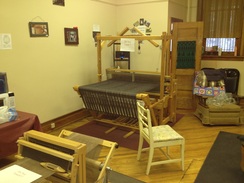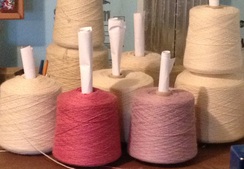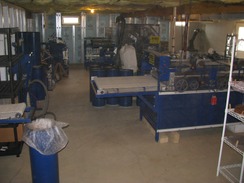Alpacas and the Cottage Mill Industry
A Love Affair with Fiber
When setting up the fiber mill, Mike and Elizabeth wanted to leave the smallest carbon footprint when processing products, so to achieve this Mike went back to his knowledge of heavy industry and combined it with their love for the environment. One step was the installation of the SkyStream wind turbine that produces electricity to run their Belfast equipment. The next step was the implementation of the ground source geothermal to not only heat and cool their home and the mill, but preheat the water used to scour clean the incoming fiber for processing. Elizabeth was pleased to find out that their new scouring system also utilizes a water recycling tank further reducing the impact on the environment.
What does all this mean for their customers and the world? “By going green we reduced the amount of fossil fuels used during production, which is good for everyone. And when accessing natural energy sources we can keep our production costs lower. These savings are passed on to our customers.”
Continuing with green in mind Mike started testing for a way to eliminate chemicals from the milling process. The result not only saves the customers more as chemicals cost money, but the finished product is a smoother, more consistent all natural yarn, sought out by those who are extremely sensitive to additives. Mike states further, “The process has become so popular our internship training program has doubled in enrollment.”
Mike goes on to explain that spinning fiber into yarn is an art form and the transformation from spinning wheel to mill spinning was an easy one, however that is where his addiction really took off. An addiction his customers have willingly fed, keeping the mill running 16 hours a day well over 350 days a year. The orders come in from as far away as California, Kansas, and Florida, and others come from right down the road. One of Mike’s favorite saying is, “We’ll take in a one pound order or a thousand pound order. We have processed sheep wool, mohair, rabbit, alpaca, camel, and even K-9. We have also used a variety of blending fibers such as Merino top, bamboo, Sari silk waste, nylon and more. Each order is shown the same amount of care as we do with our own fiber. We understand that these fleeces are important to the owners and strive to produce the best product possible.
Milling fiber is a multi-step process – a process that cannot be hurried. The fiber is recorded the day it arrives at the mill since they process on a first come – first serve basis. Processing all starts by opening those boxes of fiber and finding what treasure is inside. Mike will do an evaluation of the raw fiber. “We have been pretty successful at getting the customer what they have asked for. There have been occasions where we have had to phone people and tell them that what they want is not working out and provide a recommendation. We want customers to have a beautiful, usable finished product that they are happy with. Sometimes the fiber ‘tells’ us something different than what is requested.”
Once the boxes are opened the fleeces head to the tumbler to help get rid of dirt, vegetation and shorts. Everything that comes into the mill gets washed in their industrial washing system. “It’s just a good idea” says Mike. “We cannot afford to have any of our equipment go down for any reason. This also ensures we get any residue or sprays off the fiber that may affect the processing.”
Next comes drying, every fleece is laid out on shelving until it is dry. The order then heads to the picker that helps to pull the fiber apart. Depending on the request, some of the blending with other fibers or materials occurs here. Then comes the fiber separator. This “little” machine is best at removing most of the vegetation, guard hairs and shorts that have made it this far. It also works as a type of precarding machine where it starts to get the fibers lined up and “in order”.
From there it’s on to the carder. This is probably the hardest used machine in the mill. The carder is fed at one end, lines all the fibers up and a beautiful roving or batting comes out the other end. The roving can be a finished product or it goes on to become yarn. The batting can also be the end product or they provide a wet felting service. If felt is on the order, the batting goes on to the felting table to create 3’x4’ sheets of felt.
If the end product is to be yarn, once the roving comes off the carder, it heads to the draw frame. This machine lines the fibers up even more and helps to even out the roving in order for the spinner to run smoothly and consistently. And then the spinner is the next step – it does exactly what it sounds like – it spins the roving into a single ply yarn or thread. This is the machine that takes some finesse. If the request is a 3-Ply Sport yarn, the operator needs to know how thick each of those individual threads or plies are so that when plied together it comes out to be 3-Ply Sport. Mike has gained quite a bit of experience and knowledge with this machine and has gotten very good at knowing what is needed from the spinner to create the right product.
Once the spinning is done, it’s off to the plyer to make the end product. Most common is a 3-Py product. However a 2-Ply product is sought after as well because it has a different look that gives the finished product a slightly different textured look.
From the plyer, the yarn is put onto cones. Each bobbin is attached to the previous by an air splicer. “We never tie knots in our yarn – there is nothing more frustrating than getting part way through a skein of yarn and finding a knot. You then need to deal with that and either rejoin the ends with a different method or hide the knot in the project…it’s just aggravating so we don’t do it.” says Elizabeth.
Next step is the steamer. The yarn is steamed in order to set the twist. It is the same concept as putting your hand spun in hot water or a steam bath. It also softens the yarn. And finally off to the skein winder. They will put your yarn into any size skein you want, or leave it on the cone. From here the order is now ready for packing and shipping.
Mike and Elizabeth have spent enough time in the mill that together they can get almost all of the machines going at the same time and running efficiently. They each have “their own” machines and then other ones they “share” and keep things going. “It can get crazy and we do end up in each other’s way at times. It’s serious from the aspect that we want to provide the best quality product for everyone but at the same time we need to have fun and lighten the mood….we spend a lot time in the mill together.”
One thing they have tried and found to be successful for the fiber mill is getting a host farm and doing fiber pick-ups to help save on the cost of shipping. As Mike explains, “we try to partner with a few of our larger customers to have a fiber pick-up day. The concept we advertise is to have local farms get their fiber to these host farms and then we travel with our trailer to pick-up what they have brought in. It benefits us by being able to meet customers and helps them save on shipping and we hope it benefits our host farms by having the people go to the farm and not only drop off fiber, but see the product that we can produce and showcase the host farms alpacas, farm store or whatever else they may offer.” They will also travel to local shows and festivals to pick-up fiber as well. “In a way it is a mini-vacation for us, we get out and have the opportunity to meet our customers in person.”
There is always the urge to learn or try something new. “One of the benefits to having our own animals means we have our own fiber to experiment on. Obviously we don’t want to ruin anything but trying different things is a great way to learn and see what the end product comes out as. So far we have been pretty successful and have been able to use some of these ‘experiments” as marketing tools.” They continue to learn and have plans to expand their business in the future by adding new products to both the mill and the shop.
While Mike’s love for milling is intense, Elizabeth’s love for finished product is just as strong and they found a way to feed her hobby also. This past year they started using their weaving, knitting, and crocheting skills to take their customer’s finished yarns and transform them into wearable pieces of art. Scarves, shawls, hats, fingerless gloves, and blankets are handmade at their weaving center. The shop is not only an outlet for the finished item but a great place to pass on the knowledge developed for the different fiber arts. “Not only are we teaching people a new art form, we are exposing them to the joy of working with all types of natural fibers.” There is always some type of project being worked on for people to see when they stop in and demonstrations for them to try.
The weaving center is located within their retail store and there you can fulfill your knitting “jones”, or partake in a number of fiber related classes. While weaving and spinning lessons are done “one on one”, knitting and crocheting classes are done in a group setting that has been described by many as a meeting of the minds. It’s a place to come to, relax with a cup of coffee or tea and just get away for a bit.
You can find the retail store at 22 South Main Street in the heart of historical Muncy Pennsylvania. They have achieved an admirable 90% domestic product rating for sale in their shop. Many items are made in house, where you can purchase natural yarns from PA raised animals, fashions made on the east coast, or wheels and looms manufactured in Colorado. Lazy Meadows Alpacas also features dozens of local artist who make anything from candles and jewelry to primitives and stained class.
So if you’re a large rancher, run a farm with a dozen animals, or only own one or two critters, Lazy Meadows Alpacas & Fiber Mill just may be the place you’ve been looking for. They have a love affair with all things fiber and while some may say it’s a cottage industry, Mike and Elizabeth say they are “Livin’ the Dream”. Perhaps they have reached their own personal Zen.
For more information see www.lazymeadowsalpacas.com for details, prices, and upcoming events. Or send them an e-mail at [email protected], they will be happy to help.
May 17, 2013
